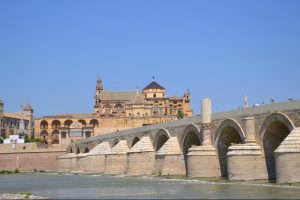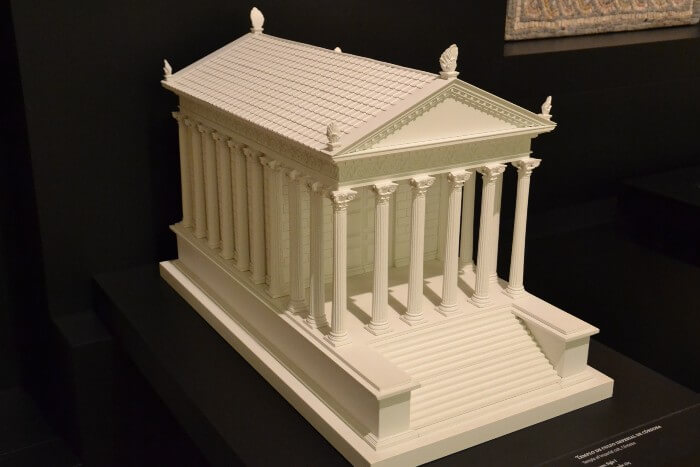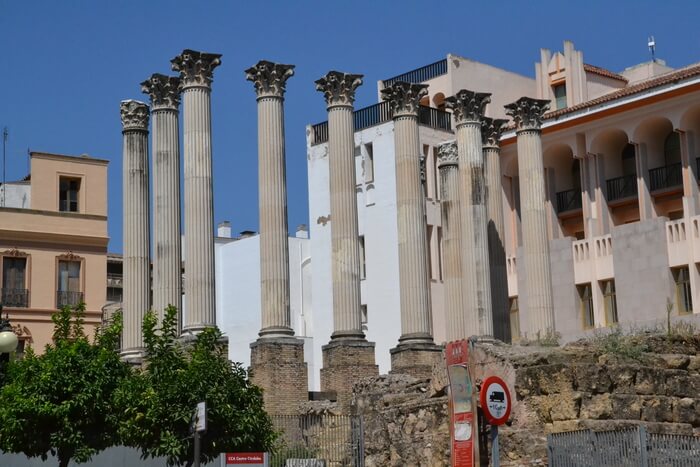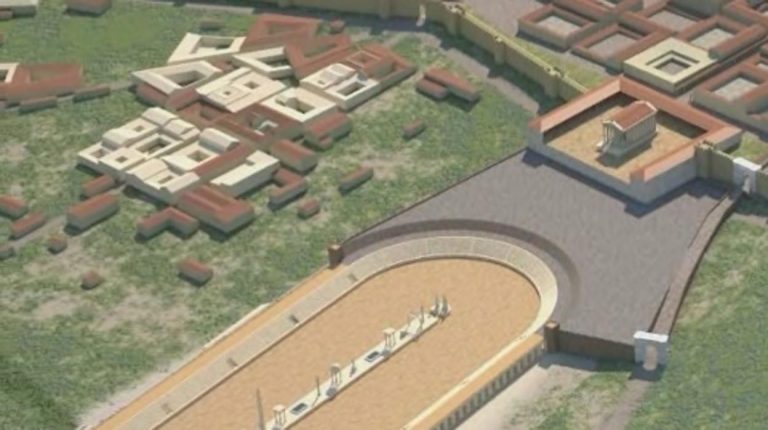
The Roman Bridge of Cordoba (El Puente Romano) In the 1st century AD, the Romans built the first bridge in Cordoba that crossed the Guadalquivir
This incredible Roman Temple (first century AD) was discovered during the expansion of the city hall in 1951. This discovery was a find of great archaeological importance for the city.
According to archaeologists, the size of the temple and the materials used are indicative of the political and economic power of the city during the Roman period.


This type of temple was common in large Roman cities.
Although the Roman temple of Cordoba was started by Emperor Marcellus, it was not finished until the reign of Domitian (1st century AD).
At that time Roman emperors were regarded as a god, and therefore they were venerated throughout the Empire.
As part of the worship of the emperors, great temples were built in the most important cities of the Empire, such as the Roman Temple of Cordoba.
Inside the temple rituals, prayers, offerings, and sacrifices were celebrated.
The Roman Temple of Cordoba, since its discovery in the middle of the 20th century, has become one of the icons of the city. In fact, it is the best preserved remains of the Roman period in Cordoba.
Unfortunately, other important buildings of the Roman period, such as the Circus or the Amphitheater, were buried.
At the same time, thanks to the work of archaeologists and historians we can affirm that the Roman Temple of Cordoba was a famous building throughout the Roman Empire. Proof of this is that the Roman authorities spared no expense in building the Roman Temple of Cordoba.

"Cordoba became one of the main cities of the Roman Empire"
Practically the entire building was constructed in marble. According to experts, the level of refinement in carving the marble is difficult to find in other buildings of the Roman Empire. Without any doubt, the best craftsmen of the Empire participated in the construction of this building.
However, constructing the entire building in marble posed a serious problem. The building was too heavy.
To support the enormous weight of the temple, the engineers of the Empire used a novel system called (“antierides”). Very few buildings in the Empire have this foundation system.
Currently, the only remains of the building are its foundation, the staircase, the altar and some shafts of columns and capitals.
Unfortunately, the temple is not open to tourists. It is only possible to visit it from the outside. Anyway, it is worth a visit, even if only from the outside.
The Roman Temple of Cordoba was part of a much larger complex (Provincial Forum) that also included the Roman Circus.
The Roman Circus was one of the most important parts of a Roman city. At the Circus all kinds of public events took place (races, shows, and performances, which commemorated important events of the Empire).
Both buildings, the Circus and the Roman Temple, were located near the Via Augusta.
The Via Augusta was undoubtedly one of the most important Roman roads of the Empire. It was more than 1.500 kilometers (more than 900 miles) long and crossed Spain from the Pyrenees to Cadiz.
You can bet that this incredible architectural ensemble (Roman Temple and Circus) left the outsiders speechless.

The Roman Temple of Cordoba is located in the historical center, very close to the Jewish Quarter (10-minute walk).
To be more exact, the Roman Temple of Cordoba is located between Plaza de las Tendillas and Plaza de la Corredera.
Undoubtedly, the construction of such an important building speaks of the importance of Cordoba during Roman times.
So much so, that Cordoba earned the title of Colonia Patricia in 46 B.C. This title granted the inhabitants of Cordoba the status of Roman citizens.
Only two other cities in Spain achieved this privilege: Emerita Augusta (Merida), capital of Lusitania, and Tarraco (Tarragona), capital of Tarraconense.
After being named Colonia Patricia, the Roman authorities began an extensive program to reform the city, which included the construction of important buildings and critical infrastructures.
closed to tourists
Calle Capitulares 1
1st century AD
closed to tourists

The Roman Bridge of Cordoba (El Puente Romano) In the 1st century AD, the Romans built the first bridge in Cordoba that crossed the Guadalquivir

Cordoba Jewish Quarter (Judería de Córdoba) In the heart of the historic centre of Cordoba you will find the Judería, one of the best preserved

Cordoba What to Eat Local cuisine in Cordoba include unique food dishes that are rich and flavorful. This is a pleasant surprise to most travelers,